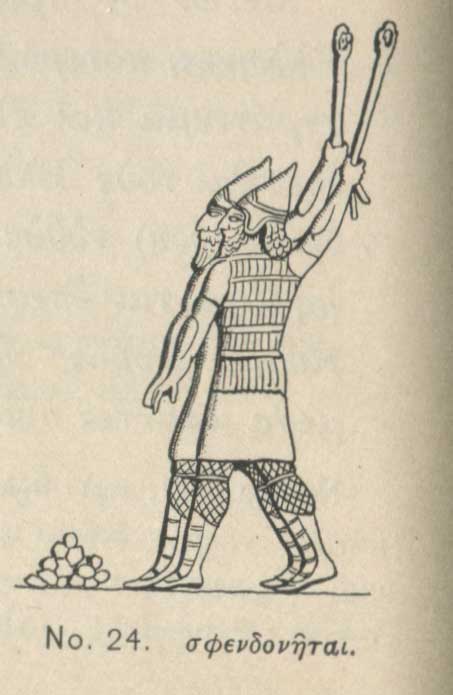THE FIRST GREEK BOOK
BY JOHN WILLIAMS WHITE, PH.D, LL.D., LITT.D.
Professor Of Ancient Greek At Harvard University
This Revision Copyright ©2012 by Shawn Irwin
Lesson XXXVII - Interrogative and Indefinite Pronouns
S353. The principal interrogative pronoun is τίς, τίς, τί,
who? which? what? (Latin quis). It always has the acute accent on the first syllable, except in the short forms
τοῦ, τῷ, and never changes the acute to the grave.
S354. The indefinite pronoun is τίς, τίς, τί, some, any
(Latin aliquis), or, used substantively, somebody, anything (Latin quidam). It is enclitic.
S355. Learn the declension of τίς and τίς in 763.
S356. VOCABULARY.
δέω, δεήσω, etc., lack, want, need, middle, lack, desire, request,
δεῖ, used impersonally, there is need, it is proper, one ought.
ἐπαινέω, ἐπαινέσω, etc., praise.
ἕτερος, α, ον, the other, one of two; without the article, another, other.
ἥδομαι, ἡσθήσομαι, ἥσθην, be glad, be pleased.
Μένων, ωνος, ὁ, Menon.
ποῖος, ᾱ, ον, interrogative pronoun, of what sort? Latin, qualis.
πόσος, η, ον, interrogative pronoun, how much? Latin quantus.
σφενδονήτης, ου, ὁ, (compare σφενδόνη), slinger.
τίς, τί, interrogative pronoun, who? which? what?
τὶς, τὶ, enclitic indefinite pronoun, a, some, any, a certain,as noun, somebody, anything.

S357.
1. τοῦτο λέγει τις.
2. τίς τοῦτο λέγει;
3. λέγουσι δὲ τινὲς ὅτι Κῦρος ἥσθη.
4. ἦν δὲ τις ἐν τῇ στρατιᾷ Μένων Θετταλός.
5. καὶ ἐρωτᾷ τὸν σψενδονήτην πόσον ἀργύριον ἔχει.
6. ἐὰν νῑκῶσι, τί δεῖ αὐτοὺς λύειν τὴν γέφῡραν;
τί Adverbial accusative, why? (835).
7. ἐν ποίοις πράγμασιν ἦσαν οἱ Ἕλληνες;
8. ἐρωτᾷ τίνος ἐστὶν ὁ ἵππος.
τίνος Predicate genitive of ποssession (843).
9. Κῦρος ἔπαισεν ἄνδρα Πέρσην καὶ ἕτερον τινα τῶν ἡγεμόνων.
10. ἐρωτᾷ τὸν ἄγγελον τίς ἐπαινεῖ τοὺς Μένωνος στρατιώταs.
S358.
1. Why need the men proceed?
2. What does he say to this?
πρὸς with accusative.
3. Somebody asks whether you said this.
4. What sort of men ought to take the field?
5. How many slingers have you in the army?
S359. Cyrus is greatly pleased and he himself crosses the Euphrates.
οἱ δὲ Μένωνος στρατιῶται ἐπὶ ταῦτʼ ἤκουσαν, πείθονται καὶ
διαβαίνουσι τὸν ποταμὸν πρὶν τοὺς ἄλλους λέγειν τί ποιήσουσι.
Κῦρος δὲ ἥσθη τε καὶ τῷ στρατεύματι δι᾽ ἀγγέλου ἔλεξεν˙
"Ἐγὼ μέν, ὠ ἄνδρες, ἤδη ὑμᾶς ἐπαινῶ˙ εὐθὺς δὲ καὶ ὑμεῖς
ἐμὲ ἐπαινέσετε, ἢ (or) οὐκέτι ἐγὼ Κῦρός εἰμι. οἱ μὲν δὴ
στρατιῶται ἐν ἐλπίσι καλαῖς ἦσαν, Μένωνι δὲ καὶ δῶρα
λέγεται πέμψαι. μετὰ δὲ ταῦτα διέβαινε τὸν ποταμόν˙
εἵπετο δὲ καὶ τὸ ἄλλο στράτευμα αὐτῷ ἅπαν.
πρὶν λέγειν: before the rest said.
ἐμε: me, accusative. See the notes on 278, 1 and 3.
πέμψαι: to have sent, aorist active infinitive.
εἵπετο: for the augment, see 871, 5.
αὐτῷ: compare 352, 2.
See the route on the map.
End Of Chapter
INDEX
Chapter 38
HOME
This Revision Copyright ©2012 by Shawn Irwin
